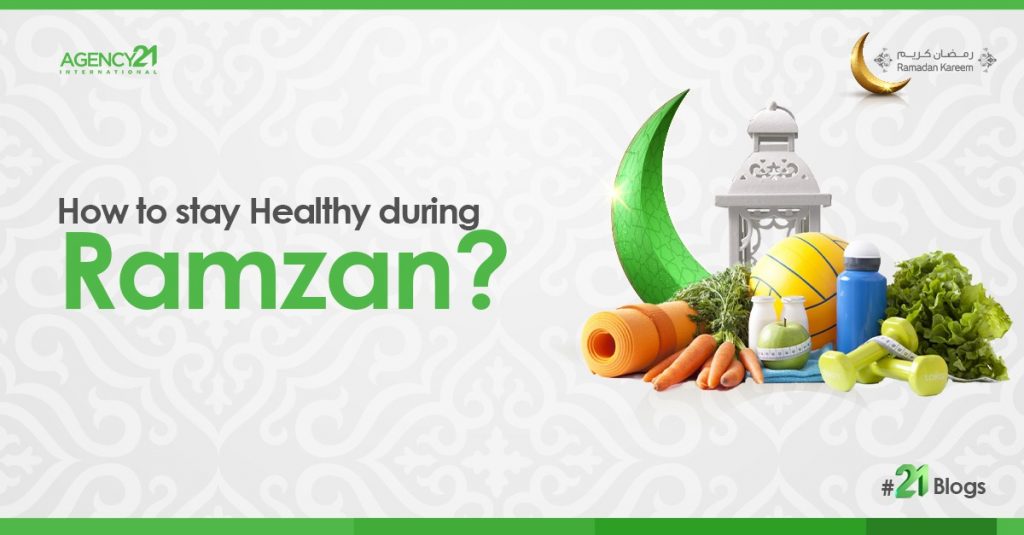How to stay Healthy during Ramzan?

It’s important not to go overboard when eating during Ramzan. Consuming a lot of deep fried, creamy and sweet foods may actually cause you to gain weight during Ramzan.
So, let’s take a step back for a moment and think about our priorities!
Every year, most of us start Ramzan with lofty targets but, in contrast, we gorge on all the wrong kinds of food!
Several dietary surveys show that food choices during Ramzan undergo very significant variations, consequently, signals the start of gastronomic over-indulgence, sleep deprivation, chronic fatigue and indigestion.
As Ramzan is here, it’s a time to develop heightened consciousness for control behaviour and attitude towards our lifestyle. A slight vigilant attitude and changes in behavior improve the balance of our diet that we can sustain in the longer term.
It’s an ideal time to cleanse the body and soul by treating it as a detoxification month by having a healthy diet, consequently improving our physical and mental health.
Here’s how one can combine fasting and healthy diet sagely to garner tangible physical benefits.
But what constituted the healthy diet?
To meet the right amount of energy and nutrients your body needs during the day, you should eat foods rich in protein, carbohydrates, vitamins, and minerals with enough water to boot.
Try to tweak your habits and incorporate following healthy practices to make your Ramzan nutritious and refreshing:
Drink to keep yourself hydrated:
Drinks based on water, milk, fruit juices and smoothies are a perfect sip to have in Iftar and Sehar as it provides hydration along with essential nutrients without any added sugars.
Have fruits for right nutrients:
Fruits are desirable first-food that should consume upon breaking a fast to nourish the body as they contain water content and are easily digested. The list kick starts with seasonal fruits preferably watermelons, grapes, apples and the list go on depending upon your choice.
Cruciferous vegetables for fiber:
Cruciferous vegetables are great sources of vitamins, but cruciferous ones like broccoli, brussel sprouts, and cauliflowers are fiber-rich foods that will keep you regular and prevent constipation as fiber also has the ability to make you feel full, which is helpful when you can’t eat again for another 12 odd hours.
Oil and Sugar – but in control amount
Islam stresses the need for moderation in all actions, and this includes food consumption. You can have parathas and pakoras in limit, perhaps once-a-week treat rather than a daily indulgence.
Instead of pakoras at Iftar, try a healthy channa chaat with loads of veggies and spices or dahi baday which are much less oily. Also, have dates to restore sugar and salt level in the body.
What to Avoid?
To have healthy Ramzan, try to cut down on deep-fried foods as they cause indigestion, heartburn, weight gain and make you feel bloated rather substitute your diet with grilled, baked, steamed or shallow-fried foods.
High sugar and high fat foods give the body a sudden energy rush which makes it difficult to fast the whole day.
Similarly, try to avoid frizzy and caffeinated drinks as these are diuretic and promote water loss through urination leading to dehydration. Also, try to avoid citrus fruits as they are too acidic for your stomach.
Self-discipline is the right approach:
Celebrate your Ramzan with an accurate amount of food by limiting unhealthy food to bite-size portions rather than platefuls that you wolf down.
Remember that you only have a relatively short time each day to eat and drink to provide your body with all the essential nutrients and fluids it needs to be healthy, so the quality of your diet is especially important during Ramadan. In a nutshell, with a bit of self-discipline and restraint, this is the perfect time to kick-out a bad habit and embrace the healthier one.

